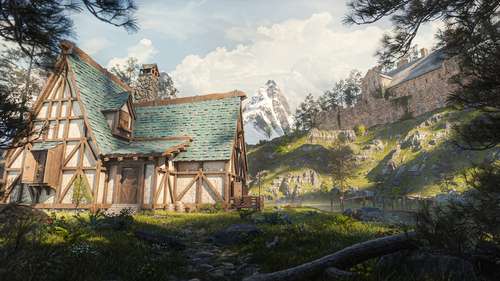Imagine you’re in the middle of an intense gaming session on your PC. Your screen is alight in dynamic color, enemies surround you, and you’re just about to execute the perfect move. But suddenly, the game lags, graphics glitch, and your win slips away. Sounds familiar?
Almost every hardcore gamer has faced this challenge with their gaming device at one point in time or the other, and moments like these boil down to the processor powering your game—so understanding the difference between a GPU and CPU for gaming isn’t just technical; it’s essential. It’s what stands between a fluid, immersive experience and one marred by delays and frustration.
In the fast-paced, competitive world of gaming, your choice of processor (whether GPU or CPU) plays a defining role. Both are critical, but each handles different aspects of gameplay.
To truly elevate your gaming experience, it’s vital to know what each one brings to the table, when to prioritize one over the other, and how they work together to create that seamless, high-octane gaming experience you crave. After reading this article, you should know exactly what you need to build the perfect gaming PC for your specific needs.
Understanding the Core Difference Between GPU and CPU

At the heart of your gaming setup are two processors: the Central Processing Unit (CPU) and the Graphics Processing Unit (GPU). They may sound similar, but their roles are distinct, each tailored to handle unique tasks within your system.
CPU: The Brain of Your System
The CPU is often described as the “brain” of your computer. It handles all the instructions needed to run software, execute commands, and keep your system responsive. For gamers, the CPU is responsible for the game’s logic, physics, and AI—essentially, the behind-the-scenes work that makes characters behave realistically, makes environments interact as they should, and commands process quickly.
GPU: The Artist in Action
The GPU is the powerhouse responsible for rendering visuals. Think of it as the “artist” creating the stunning graphics and special effects that bring your game to life. A strong GPU ensures high-resolution textures, fluid animations, and intricate details, allowing you to game in 4K, experience rich textures, and enjoy fast frame rates without lag.
Each processor is crucial, but depending on the type of games you play and the performance you seek, one may take precedence over the other. So, let’s dive deeper to understand when to prioritize a CPU or a GPU for gaming.
When to Prioritize GPU Over CPU for Gaming
In most gaming setups, the GPU takes center stage, especially in graphics-intensive games. Here’s why:
Graphics-Heavy Games Need Powerhouse GPUs
Titles with intricate visuals, (like Cyberpunk 2077, Red Dead Redemption 2, or Assassin's Creed) demand significant graphical rendering power. High-resolution textures, shadows, and real-time lighting effects require a GPU that can keep up without stuttering or reducing frame rates. In these scenarios, investing in a top-tier GPU can significantly enhance your experience, allowing you to game in ultra settings with crisp details and smooth motion.
Higher Resolution and Refresh Rates
If you’re gaming on a 4K monitor or using a setup with a high refresh rate (120Hz or above), your GPU will carry most of the weight. The GPU’s parallel processing capability enables it to manage these heavy graphical demands efficiently, making it possible to play games with ultra-high resolutions, HDR lighting, and realistic textures without dropping frames.
VR Gaming: GPU’s Domain
Virtual reality (VR) gaming is particularly GPU-intensive, requiring extreme precision in rendering to ensure smoothness and immersion. A powerful GPU can handle the high frame rates VR requires (often 90 FPS or more) to prevent motion sickness and deliver a fully immersive VR experience.
When CPU Performance is Essential for Gaming
While the GPU may often be seen as the star, the CPU’s role in gaming is crucial, particularly for certain types of games and multi-functional setups. Here’s when a high-performance CPU becomes essential:
Open-World Games and AI-Driven Environments
Games with expansive worlds and AI-driven environments, like Minecraft, The Sims, or large multiplayer online games, depend heavily on CPU power.

The CPU manages the game's logic, keeps track of numerous objects, processes AI, and manages NPC (non-playable character) behavior in real time. If your CPU is underpowered, you’ll experience stuttering and reduced performance, no matter how powerful your GPU might be.
Simulation and Strategy Games
Simulation games like Cities: Skylines or Total War require the CPU to handle complex calculations and logic. These games may not rely as much on visual rendering but need strong CPU capabilities to manage intricate game mechanics, especially as these simulations grow in size and complexity.
Streaming While Gaming
If you’re gaming and streaming simultaneously, a strong CPU becomes invaluable. While the GPU manages the game graphics, the CPU handles encoding, streaming software, and chat monitoring. Investing in a CPU with multiple cores can prevent slowdowns, keeping both your game and stream running smoothly.
The Sweet Spot: Balancing GPU and CPU for a Seamless Gaming Experience
To achieve peak gaming performance, the balance between CPU and GPU is key. A common misconception is that investing solely in the most powerful GPU or CPU will yield the best results. In reality, they work best as a team.
Avoiding Bottlenecks
Bottlenecking occurs when one processor outperforms the other, limiting your system’s overall capabilities. For instance, pairing a high-end GPU with a low-end CPU can cause the CPU to struggle with processing game logic, creating delays even if your GPU is capable of high performance. Conversely, a top-tier CPU with a weak GPU may lead to poor graphics quality and lag, especially in visually demanding games.
CPU and GPU Recommendations by Gaming Needs
With what you've learned, you now understand that for the best experience, you should consider a balanced setup:
Budget Gaming
Aim for mid-range CPUs like the AMD Ryzen 5 or Intel i5, paired with a compatible GPU like the NVIDIA GTX 1660 or AMD RX 5700. This setup handles most games at medium to high settings without lag.
High-Performance Gaming
A CPU like the Ryzen 7 or Intel i7 combined with a powerful GPU, such as the NVIDIA RTX 3070 or AMD RX 6800, allows for high-resolution gaming, fast frame rates, and even VR without compromise.
Ultra-High Gaming and Content Creation
For those who game, stream, and create content, CPUs like the AMD Ryzen 9 or Intel i9 paired with top GPUs like the NVIDIA RTX 3080 or AMD RX 6900 XT will provide smooth performance, exceptional multitasking, and superior graphics quality.
Choosing the Right Processor: Key Factors to Keep in Mind
Selecting the ideal CPU and GPU for gaming involves understanding your specific needs and gaming style. Here’s a checklist to guide your decision:
Game Type
Are your favorite games CPU-heavy simulations or GPU-heavy AAA titles?
Resolution and Refresh Rate
Higher resolutions and faster refresh rates require a strong GPU.
Multitasking
For those who stream, create, or use multiple applications while gaming, a multi-core CPU is essential.
Future-Proofing
Gaming technology evolves quickly. Investing in a balanced CPU and GPU setup that will last for several years will ensure smooth performance even as new games are released.
Final Thoughts: Mastering Your Gaming Setup with the Right Processors

The journey to building your ideal gaming setup starts with understanding the unique roles of the GPU and CPU. Recognizing the difference between GPU and CPU for gaming can transform your experience, helping you avoid frustrating lag, pixelation, and performance dips.
A well-chosen setup tailored to your gaming needs isn’t just about equipment; it’s about preserving the immersive, high-quality gameplay that makes gaming truly enjoyable.
Ultimately, achieving the right balance between GPU and CPU for gaming is an investment in your experience. When each component operates at its best, they complement each other seamlessly, allowing you to lose yourself in breathtaking graphics, realistic worlds, and the thrill of each victory.




